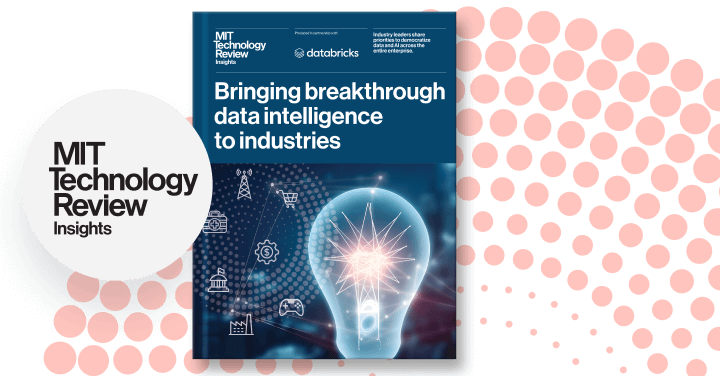Treating Data and AI as a Product Delivers Accelerated Return on Capital
Industry experts deliver insights on accelerating successful digital transformation

The outsized benefits of data and AI to the Manufacturing sector have been thoroughly documented. As a recent McKinsey study reported, the Manufacturing segment is projected to deliver $700B-$1,200b value through data and AI in cost savings, productivity gains, and new revenue sources. As an example, data-led manufacturing use cases, powered by data and AI, reduce stock replenishment forecasting error by 20-50%, increasing total factory productivity by 50% or lowering scrap rates by 30%.
It shouldn’t be a surprise that the largest customers using the Databricks Manufacturing Lakehouse outperformed the overall market by over 200% over the last two years. What drove this success? These digitally-mature Lakehouse practitioners had:
- more agile supply chains and profitable operations enabled by prescriptive and advanced analytical solutions that foresaw operational issues caused by COVID-19 disrupted supply chains.
- advanced prescriptive analytics that promote uptime with prescriptive maintenance and supply chain integration.
- new sources of revenue in this uncertain time.
Data + AI Summit 2022 featured several of these industry winners at the Manufacturing Industry Forum. These experts shared their experiences of how data and AI are transforming their businesses and delivering a stronger return on invested capital (ROIC). We’d like to highlight some of their insights shared during the event.
Manufacturing Industry Forum Keynote
Muthu Sabarethinam, Vice President, Enterprise Analytics & IT at Honeywell, kicked off the session with his keynote: The Future of Digital Transformation in Manufacturing. Part of his talk focused on how to approach a digital transformation project; in his own words: “start first with data contextualization in the digital transformation process,” meaning start by leveraging IT and OT data convergence to bring all relevant data in context to the users.
Citing that only 30% of projects are productionalized and escape POC Purgatory, he explored the use of AI to create data of value and provided insight on the concept that AI has the potential to streamline data cleaning, mapping, and deduping. In his own words: “Use AI to create data, not data to create AI.”
He further explored this point by providing an example of how contextual information was leveraged to “fill in the gaps” in master data during Honeywell’s consolidation of fifty SAP systems to ten, which involved using AI to map, cleanse and dedupe data and led to significant reductions in effort. Using these techniques, Honeywell boosted its digital implementation success ratio to nearly 80%.
Key insights delivered to accelerating AI adoption and monetization:
- Build your AI engine first, then feed other use cases.
- Deliver persona-led data to your users.
- Productize the offering, allowing products to change behavior through application-based services that overcome adoption challenges of immature offerings.
In summary, a key insight was, “don’t wait for the data to be there, use AI to create it”.

Data intelligence reshapes industries
Muthu Sabarethinam (Honeywell), Aimee DeGrauwe (John Deere), Peter Conrardy (Collins Aerospace), Shiv Trisal (Databricks)
Manufacturing Industry Panel Discussion
Muthu Sabarethinam, Aimee DeGrauwe, Digital Product Manager of John Deere and Peter Conrardy, Executive Director, Data and Digital Systems of Collins Aerospace formed a panel discussion hosted by Shiv Trisal (a Brickters of only three weeks) that discussed three major topics timely topics in data and AI:
Data & AI investment in a challenging economic backdrop
The panel discussed how businesses are accelerating their use of data and AI amongst all the supply chain and economic uncertainty. Mr. Conrarday’s perspective: even in uncertain times, access to data is a constant, leading to initiatives that help gain more value from data. Ms. DeGrauwe echoed Peter’s perspective with: “we are seeking now to drive more AI into their connected products and double down on investment in infrastructure and workforce.” Shiv Trisal summarized the conversation with, “speed, move faster, commit to the vision and don’t wait, we have to do this”.
Data & AI driving sustainability outcomes
The panel members all agreed that sustainability is not a fad in manufacturing, but basic principles of operational excellence and energy conservation are just good business tactics. Ms. DeGrauwe commented, “our customers are intrinsically linked to the land” and “the [customer] desire to be environmentally sound has driven technologies like Deere’s See and Spray product, using machine vision as a foundational technology, to selectively identify and apply herbicide to weeds reducing herbicide use by 75%”. “Deere is supporting sustainability by no longer managing operations at the farm level or field level but by moving down to the granular plant level, to do what plants need and no more”.
Mr. Sabarethinam looked at sustainability through a slightly different lens, providing insights into Honeywell’s organization, explaining that “it gives a sense of purpose” to the organization’s employees and that Honeywell’s products enable connected households and businesses, energy reduction, and fugitive emission capture – all of which are core tenets of sustainability.
Mr. Trisal summed the conversion up with his insight that we could miss a larger opportunity if we only thought about sustainability in the context of point solutions and should also consider the effect on the organization and how sustainability percolates value from direct customers to their customers.
Measuring success of data & AI strategies
This topic explored a number of areas, and Mr. Sabarethinam shared that a successful organization elevates the conversation to the senior levels, driving and managing the conversation through measured financial data and analytics-driven measurements on hard document savings. Mr. Conrarday shared that data and analytics projects need to be treated like a product, where the customer and financial outcomes are deeply embedded in the project planning and execution. He pointed out that successful projects typically are funded by a department or business segment, as other business segments do not have “any skin in the game” to ensure success; a successful project is not done for free and has established metrics that are confirmed to ultimately deliver hard financial results to the business. Ms. DeGrauwe got an unexpected laugh when speaking about one of the challenges the John Deere team has when teaching the organization what machine learning is and how it will benefit the business. Ms. DeGrauwe commented that a colleague said, “we’ll know success when they stop saying, “just put it in the ML”, as if ML was a special department, product or mystical black box.
The Future
The panel finished the discussion by filling in this blank, “I could achieve 10x more value if I could solve for ______”. Mr.Conrarday suggested that solving for Edge in an aviation segment would be the place he would concentrate, and humorously suggested to sensor the entire aircraft fleet at zero cost in zero time. Ms. DeGrauwe suggested that it all comes back to the data and the AI it produces. Accessing good clean data at reasonable cost in a repeatable fashion across a variety of legacy disparate systems will drive advanced use cases driving upsized value. Mr. Sabarethinam reinforced his earlier comments about the contextualization of data and its delivery to the right persona at the right time delivers outsized benefits.
Clearly, Ms. DeGrauwe, Mr. Mr.Conrarday and Mr. Sabarethinam have deep industry experience and see a bright future for Manufacturing by leveraging data and AI. Their collective insights should help both those digitally mature and those just starting out in their digital transformation journeys achieve a measurable accelerated return on capital and improve their success ratio of digital projects by preventing them from falling into POC Purgatory. Each company is currently leveraging the Databricks Lakehouse Platform to run business-critical use cases from predictive maintenance embedded in John Deere’s Expert Alerts to seamless passenger journeys to connected operating systems for buildings, plants and energy management.
For more information on Databricks and these exciting product announcements, click here. Below are several manufacturing-centric Breakout Sessions from the Data + AI Summit:
Breakout Sessions
Why a Data Lakehouse is Critical During the Manufacturing Apocalypse – Corning
Predicting and Preventing Machine Downtime with AI and Expert Alerts – John Deere
How to Implement a Semantic Layer for Your Lakehouse – AtScale
Applied Predictive Maintenance in Aviation: Without Sensor Data – FedEx Express
Smart Manufacturing: Real-time Process Optimization with Databricks – Tredence
Never miss a Databricks post
What's next?

Data Science and ML
October 1, 2024/5 min read
From Generalists to Specialists: The Evolution of AI Systems toward Compound AI

Product
November 27, 2024/6 min read

